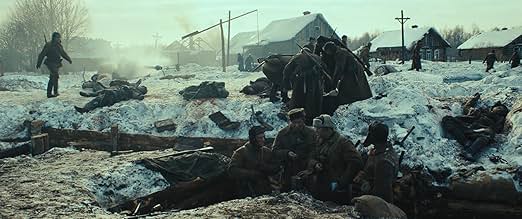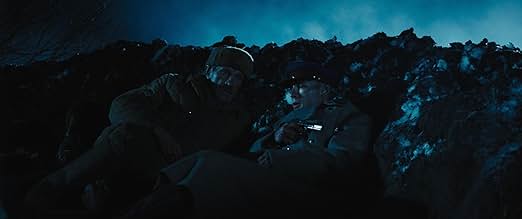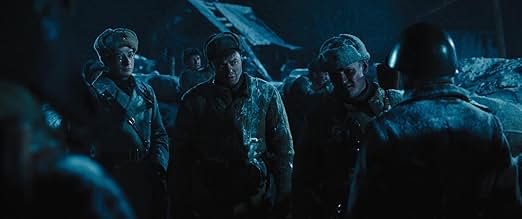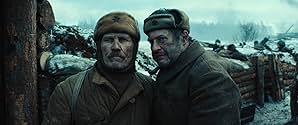IMDb RATING
6.1/10
1.4K
YOUR RATING
In the winter of 1942/1943, a series of not-so-well known, yet bloody battles occurred near the town of Rzhev. Those battles received the name of 'Rzhev Meat Grinder'. The film is based on t... Read allIn the winter of 1942/1943, a series of not-so-well known, yet bloody battles occurred near the town of Rzhev. Those battles received the name of 'Rzhev Meat Grinder'. The film is based on the award-winning novel by Vyacheslav Kondratyev.In the winter of 1942/1943, a series of not-so-well known, yet bloody battles occurred near the town of Rzhev. Those battles received the name of 'Rzhev Meat Grinder'. The film is based on the award-winning novel by Vyacheslav Kondratyev.
- Director
- Writers
- Stars
- Awards
- 1 nomination total
Daniil Voropaev
- Sgt. Lavrov
- (as Danila Voropaev)
- Director
- Writers
- All cast & crew
- Production, box office & more at IMDbPro
Featured reviews
Some of the best I've seen in WWII movies.
A real gem, a feast for connoisseurs of the subject and a well-deserved tribute to the fallen Russians who gave their lives to stop the German advance into the USSR.
A real gem, a feast for connoisseurs of the subject and a well-deserved tribute to the fallen Russians who gave their lives to stop the German advance into the USSR.
Don't look at the ratings and comments here. It's a nice experience, the movie captured me the whole time. You won't regret watching it.
I have no idea why the 5.8 score exists for this film. It truly is bewildering. Apparently the people scoring this film low are either Soviet sympathizers, Nazi sympathizers, or hate realistic war films?
I don't know. The low score makes no sense to me.
What does make sense to me is that director Igor Kopylov crafts a fine film around one of the many pivotal battles that helped shape Russia's eventual victory over the Germans leading up to the battle of Stalingrad.
Ovsyannikovo was one of the many small strategic points in the battlefield that the Soviets needed to capture to push the Germans out. The film itself is just a small look at the many lives lost trying to capture and secure this small village.
The film does a fine job of not shying away from the brutal and sadistic nature of the Germans to secure victory (massacring and raping civilians) and then systematically wiping out opposing forces.
The film also does a fine job of making it known that some of the biggest hurdles the Russian army faced in the war was from Soviet leadership!
The bureaucracy and stupidity of the Soviets cost many great and brave men their lives. A central sub-plot to the film outlines how the already thinning company would lose additional soldiers over the most trivial and banal of things.
But this is what happened, and this is why so many Russians died during World War II (and thereafter during the reign of the Soviet Union).
As far story structure is concerned, the film mostly only centers around the men stationed Ovsyannikovo, with a few snippets of the commanding officers trying to justify their logic in not sending reinforcements or properly aiding their soldiers. I almost wanted to spit into the face of the commanders wasting he lives of these brave soldiers; that's just how engrossing the film had become.
But what's more is that all of this feels authentic. Kopylov makes the battles feel grounded and realistic for the most part, and some soldiers suffer shell shock, PTSD, delirium and panic attacks, just as you would expect under those conditions. The violence is also fairly visceral and realistic; the special effects team make use of both squibbing and CGI, so while those of you who may hate the look of CGI blood, there is still some squibbing effects that help highlight the realism of the gun battles.
Overall, it's a fascinating watch. Of course it's not as over-the-top and action-packed as T-34, but it is very similar to Kim Druzhinin and Andrey Shalopa's tightly hewn war-thriller, Panfilov's 28. Ignore the low rating, I'm not sure what's going on with that, but if you can find a way to view this film definitely give it a watch.
I don't know. The low score makes no sense to me.
What does make sense to me is that director Igor Kopylov crafts a fine film around one of the many pivotal battles that helped shape Russia's eventual victory over the Germans leading up to the battle of Stalingrad.
Ovsyannikovo was one of the many small strategic points in the battlefield that the Soviets needed to capture to push the Germans out. The film itself is just a small look at the many lives lost trying to capture and secure this small village.
The film does a fine job of not shying away from the brutal and sadistic nature of the Germans to secure victory (massacring and raping civilians) and then systematically wiping out opposing forces.
The film also does a fine job of making it known that some of the biggest hurdles the Russian army faced in the war was from Soviet leadership!
The bureaucracy and stupidity of the Soviets cost many great and brave men their lives. A central sub-plot to the film outlines how the already thinning company would lose additional soldiers over the most trivial and banal of things.
But this is what happened, and this is why so many Russians died during World War II (and thereafter during the reign of the Soviet Union).
As far story structure is concerned, the film mostly only centers around the men stationed Ovsyannikovo, with a few snippets of the commanding officers trying to justify their logic in not sending reinforcements or properly aiding their soldiers. I almost wanted to spit into the face of the commanders wasting he lives of these brave soldiers; that's just how engrossing the film had become.
But what's more is that all of this feels authentic. Kopylov makes the battles feel grounded and realistic for the most part, and some soldiers suffer shell shock, PTSD, delirium and panic attacks, just as you would expect under those conditions. The violence is also fairly visceral and realistic; the special effects team make use of both squibbing and CGI, so while those of you who may hate the look of CGI blood, there is still some squibbing effects that help highlight the realism of the gun battles.
Overall, it's a fascinating watch. Of course it's not as over-the-top and action-packed as T-34, but it is very similar to Kim Druzhinin and Andrey Shalopa's tightly hewn war-thriller, Panfilov's 28. Ignore the low rating, I'm not sure what's going on with that, but if you can find a way to view this film definitely give it a watch.
The opening battle scene was good but suffered from war movie clichés, like having a guy drag another to safety only to find half his body missing. They also have those stock characters, the scavenger, the harsh Commissar, and the heroic, square jawed commander. But as the movie progresses, the actors settle into their roles. The commander is especially likable.
The movie is well structured. After the opening battle there is a tense pause before the German counter-attack. This gives the actors time to show us the state or the Red Army in 1942. We see the tension between the regular army and the Commissars. All war movies glam up battle scenes but it was less than a typical American production.
The behavior of the Commissars is portrayed negatively but we hear enough to understand why they identify so strongly with the state. This does not justify them but it lets you see them as humans who took a wrong turn. The Commissars have logical, if flawed, reasons for their decisions as their heavy handedness creates hostility. After a tense argument, a Commissar refuses to send help to a unit that just took a position, blurting out, 'whatever we send them will be a total loss'. He assumes the officer is being emotional but he is not allowing the army to prove what they could do given resources at critical times. I thought this interplay was well done but you have to look for it, this good writing.
They used the church imagery effectively. You see it wherever they went. You see them standing next to a wall decorated with icons and in a basement. Religious themes can feel forced but here it felt natural. Even the Commissars, famous for their atheism, chose to ignore its presence rather than fight it. You could see this going through their minds with one uncomfortable glance. The Church belonged there the Germans did not. When a German emerged from an Orthodox church at night with a flame thrower, it was chilling. It was as if they were assaulting the essence of the town.
The Germans were a better foil here than in American movies. In U. S. movies they are portrayed as evil but incompetent. This detracts from their seriousness. Here they are deadly and their presence is like a dark cloud.
Except for a few common war movie tropes, this was a very good movie.
The movie is well structured. After the opening battle there is a tense pause before the German counter-attack. This gives the actors time to show us the state or the Red Army in 1942. We see the tension between the regular army and the Commissars. All war movies glam up battle scenes but it was less than a typical American production.
The behavior of the Commissars is portrayed negatively but we hear enough to understand why they identify so strongly with the state. This does not justify them but it lets you see them as humans who took a wrong turn. The Commissars have logical, if flawed, reasons for their decisions as their heavy handedness creates hostility. After a tense argument, a Commissar refuses to send help to a unit that just took a position, blurting out, 'whatever we send them will be a total loss'. He assumes the officer is being emotional but he is not allowing the army to prove what they could do given resources at critical times. I thought this interplay was well done but you have to look for it, this good writing.
They used the church imagery effectively. You see it wherever they went. You see them standing next to a wall decorated with icons and in a basement. Religious themes can feel forced but here it felt natural. Even the Commissars, famous for their atheism, chose to ignore its presence rather than fight it. You could see this going through their minds with one uncomfortable glance. The Church belonged there the Germans did not. When a German emerged from an Orthodox church at night with a flame thrower, it was chilling. It was as if they were assaulting the essence of the town.
The Germans were a better foil here than in American movies. In U. S. movies they are portrayed as evil but incompetent. This detracts from their seriousness. Here they are deadly and their presence is like a dark cloud.
Except for a few common war movie tropes, this was a very good movie.
The rating on this one is baffling as it is clearly undeserved. This movie captures the Eastern Front very well, more so than many other Russian movies I have so far seen. If you liked 1993's Stalingrad, you will like this one.
Did you know
- TriviaDuring the last battle a jet trail can be seen in the sky
- How long is Rzhev?Powered by Alexa
Details
Box office
- Gross worldwide
- $1,401,156
- Runtime1 hour 53 minutes
- Color
Contribute to this page
Suggest an edit or add missing content













